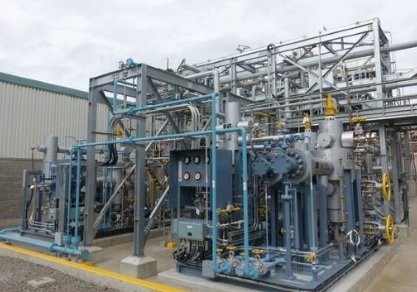
India has taken a decisive step in the fight against climate change with the launch of its first CO2-to-methanol pilot plant. This pioneering project, located in Pune, marks a significant milestone in the country’s effort to reduce carbon emissions through innovative Carbon Capture and Utilisation (CCU) technologies. It reflects India’s growing commitment to sustainable practices and the development of green technologies that contribute to both economic and environmental progress.
Project Overview
Situated at Thermax Limited in Pune, Maharashtra, the pilot plant has the capacity to process 1.4 tonnes of CO2 per day. By converting captured carbon dioxide into methanol, a valuable chemical, the plant exemplifies India’s forward-thinking approach to carbon management. Methanol, a versatile compound, has applications in energy production, chemicals, and transportation. The conversion of CO2 into methanol not only reduces the release of harmful gases into the atmosphere but also provides an alternative to fossil fuel-derived methanol, which is essential for a sustainable future.
This project stands out as one of the first of its kind in India and symbolizes the country’s broader efforts to embrace cutting-edge technology in reducing its carbon footprint.
Key Stakeholders
The development of this pilot plant is a collaborative initiative between the Indian Institute of Technology (IIT) Delhi and Thermax Limited, a leading engineering company. The project is funded through a Public-Private Partnership (PPP), showcasing the synergy between academic research and industrial expertise. The Department of Science and Technology (DST), under the Ministry of Science and Technology, has played a crucial role in supporting this project, with top officials attending the foundation ceremony to demonstrate the government’s commitment.
The partnership between academia, industry, and government underscores a shared vision of addressing climate change through innovation and cooperation. By pooling knowledge and resources, the project aims to refine and optimize CCU technologies, setting the stage for larger-scale carbon capture initiatives in the future.
Financial Aspects
With an estimated cost of ₹31 crore (approximately USD 3.7 million), the CO2-to-methanol plant represents a significant financial investment in sustainable technology. The funding, provided by the DST, reflects the government’s focus on nurturing home-grown innovations that can be scaled and adopted across various sectors. This project is part of India’s broader strategy to develop technologies that address carbon emissions while contributing to industrial growth.
Significance of the Initiative
The pilot plant’s launch is not only a testament to India’s progress in green technology but also a platform for advancing its own carbon capture capabilities. Abhay Karandikar, Secretary of the DST, described the project as a transformative initiative that will drive the development of indigenous carbon capture technologies. The success of this pilot plant could lay the groundwork for larger projects aimed at capturing and utilizing carbon dioxide on a commercial scale, making a measurable impact on the nation’s carbon emissions.
By converting CO2 into methanol, the project also offers a glimpse into the potential future of carbon reuse technologies, where harmful emissions are turned into useful products, thereby creating a circular economy.
Alignment with National Goals
This initiative aligns closely with India’s Panchamrit framework, announced by Prime Minister Narendra Modi during the COP 26 climate summit. The Panchamrit framework sets forth ambitious goals for reducing carbon emissions, increasing renewable energy capacity, and promoting sustainable development. By investing in CO2-to-methanol conversion technologies, India is moving toward achieving its climate commitments while demonstrating leadership in carbon management.
The project also reinforces India’s stance on environmental protection and innovation, serving as a model for other countries striving to balance economic growth with climate action.
Summing Up
India’s first CO2-to-methanol pilot plant in Pune is a groundbreaking project that underscores the nation’s proactive stance on tackling climate change. Through its commitment to Carbon Capture and Utilisation technologies, India is not only reducing its carbon emissions but also paving the way for future innovations in sustainable practices. This project, backed by government support and industrial collaboration, is a vital step towards meeting the country’s climate targets and driving the global shift toward a greener, more sustainable future.
By taking bold action in the fight against climate change, India is setting a powerful example for other nations, demonstrating that environmental protection and technological progress can go hand in hand.

